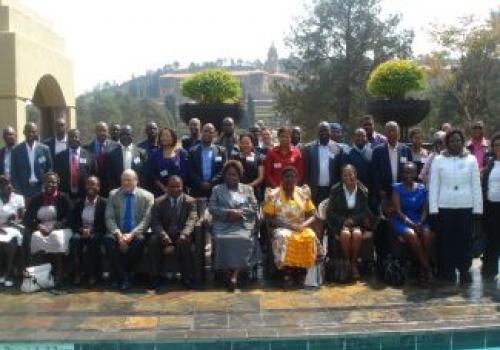A regional workshop on Sanitary and Phytosanitary (SPS) Awareness Creation was held in Pretoria, South Africa on September 12-13, 2013.
The workshop was a response to market access challenges caused by inadequate participation of private sector stakeholders in the implementation of SPS measures developed to prevent the introduction and spread of plant pests, animal diseases and food safety hazards through trade.
This is in line with the requirements of the World Trade Organisation (WTO) Agreement on the Application of SPS measures and the SPS Annex to the Southern African Development Community (SADC) Protocol on Trade.
The main outcome of the meeting was the compilation of a list of regional products and the SPS issues negatively impacting trade of those products. The products included beef, groundnuts, fruits, vegetables, fisheries, and others.All parties also agreed to work together to eliminate the SPS obstacles that are affecting trade negatively. It was noted that, to date, only two SADC Member States, South Africa and Tanzania, have engaged the WTO transparency mechanisms for resolution of specific SPS related trade concerns. Not many SADC Member States are actively participating in standard setting activities of the International Standards Setting Organisations (ISSOs) making the region predominantly a standards taker rather than a standards maker.
SADC Member State delegates considered the workshop to have been highly successful and implored SADC Secretariat to organise similar workshops in future where delegates representing regulatory authorities as well as the private sector, would both be present. The workshop comprised two parts. The first part of the workshop programme comprised technical presentations on topics related to global trade in agriculture and food products, the WTO SPS Agreement and its key principles, as well as papers on the functions of the three ISSOs namely CODEX Alimentarius, World Organisation for Animal Health (OIE), and the International Plant Protection Convention (IPPC).
On the second part, regional experts also made presentations on the SPS Annex to the SADC Protocol on Trade and the operations of regional and national SPS coordinating committees were discussed. Delegates shared and discussed the SPS challenges being experienced by farmers and food producers in the region including fruitflies, aflatoxins, foot and mouth disease, lack of harmonization of SPS measures, inadequate quality and laboratory infrastructure and the existence of parallel systems (export product lines and domestic product lines) for food safety control in many SADC Member States.
The workshop was attended by 45 regional stakeholders in the agro-industry and agribusiness value chain. Twelve (12) SADC Member States were represented at the meeting.Representatives of SADC cooperating partners including the WTO, the Food Agriculture Organisation (FAO) Southern Africa Regional Office, European Union (EU), Common market for Eastern and Southern Africa (COMESA), Trademark Southern Africa (TMSA), United States Department of Agriculture (USDA), Food and Drugs Administration (FDA) of the United States of America (USA), United States Agency for International Development (USAID) – Southern Africa Trade Hub (SATH) and Southern Africa Confederation of Agriculture Unions (SACAU) also attended the workshop which was funded by the European Union (EU) under the Regional Economic Integration Support (REIS) programme, and organised by the SADC Secretariat.

